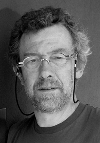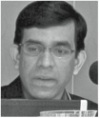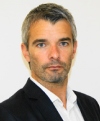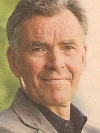Society in the Anthropocene abstracts
 Katherine Gibson
Katherine Gibson
Ethical concerns, community economies and learning to be affected by the Anthropocene
As we find ourselves implicated in the arrival of the Anthropocene, mainstream theories of economic growth, whether market or state-led, are failing human society. Devastated ecosystems and marginalized people are casualties of a growth paradigm that works against, not with, the diversity of human and ecological communities. There is an urgent need to devise ways of organizing our economy so as to increase the resilience of all life forms in a climate changing world. In this paper I examine some key ethical concerns located at the nexus of interactions between humans and earth others. I explore how by attending to the ethical negotiations of interdependence with each other and our environment we might fashion community economies that are capable of disclosing more just and sustainable development pathways. I review some concrete ethical decisions by which people are ‘building the road as they travel’—juggling wants and needs, presents and futures, selves and others, and learning to be affected by the Anthropocene.
 Peter Newell
Peter Newell
The Politics and Political Economy of Governing Carbon
Climate change has seemingly become the meta-environmental issue of our times and often features centrally in claims about the Anthropocene. This is because of the severity of its consequences and its scalar politics: the breadth of people, regions and issues that is potentially touches upon and transforms. It is often described as presenting unprecedented governance challenges because of the way the production and consumption of carbon is embodied in all aspects of everyday life and in practices that are often beyond the direct reach of states and international institutions charged with addressing the issue, and because of the divisive debates about historical and contemporary responsibility for tackling the problem.
Though most attention is paid to the (global) politics of climate change and attempts by the international community to contain its more threatening manifestations, this presentation will focus on the political economy of carbon. This refers to shifting attempts to govern carbon in ways which are compatible with prevailing development ideologies and the dominant forms of organising the global political economy. This is apparent in the marketization of climate governance as well as attempts to isolate and commodify an increasing number of ecological functions performed within the carbon cycle. Political economy approaches offer insights into what forms of (collective) action might be possible in a globalised capitalist political economy, as well as providing a lens for analysing the distributional dimensions of who wins, who loses and how from prevailing responses to climate change. As well as analysing the carbon economy and the prospects of ‘climate capitalism’, it also raises difficult justice issues and questions of strategy around how a transition to a lower carbon economy might be organised and who will bear the costs of such a transformation as well as who is most likely to benefit.
 Eric Swyngedouw
Eric Swyngedouw
Anthropocenic Promises / The End of Nature, Climate Change and the Process of Post-Politicization
”[t]he rise of the ‘the rights of Nature’ is a contemporary form of the opium for the people. It is an only slightly camouflaged religion …. It is a gigantic operation in the depoliticization of subjects.”
“ … [w]hat if at some time in the next few years we realise, as we did in 1939, that democracy had temporarily to be suspended and we had to accept a disciplined regime that saw the UK as a legitimate but limited safe haven for civilisation. Orderly survival requires an unusual degree of human understanding and leadership and may require, as in war, the suspension of democratic government for the duration of the survival emergency.”
In the paper, I explore the paradoxical situation whereby the environment is politically mobilized, yet this political concern with the environment, as presently articulated, is argued to suspend the proper political dimension. I shall explore how the elevation of the environment to a public concern it is both a marker of and constituent force in the production of de-politicization. The paper has four parts. In the first part, I problematise the question of Nature and the environment. I argue that there is no such thing as a singular Nature around which an environmental or climate policy and future can be constructed and performed. Rather, there are a multitude of natures and a multitude of existing, possible or practical socio-natural relations – and proper politicization of the environment needs to endorse this heterogeneity fully. In a second part, the emblematic case of climate change policy will be presented as cause célèbre of de-politicization. I argue how climate matters were brought into the domain of politics, but articulated around a particular imag(in)ing of what a ‘good’ climate or a ‘good’ environment is, while the political was systematically evacuated from the terrain of the – now Anthropocenic -- environment. The third part will relate this argument to the views of political theorists who have proposed that the political constitution of contemporary western democracies is increasingly marked by the consolidation of post-political and post-democratic arrangements. In the fourth section, I discuss the climate change consensus in light of the post-political thesis. I shall conclude that the matter of the environment in general, and climate change in particular, needs to be displaced onto the terrain of the properly political.
 Tania Li
Tania Li
What is Land? Making-up a Resource
A core feature of the Anthropocene is the transformation of land use on a massive scale: clearing forests, planting fields of crops, building cities, extracting minerals, and damming rivers. But before land can be used in new ways, it first has to be made-up. My paper will argue that land's "resourceness" isn't an intrinsic or natural quality, it is an assemblage of materialities, relations, technologies, and discourses. Of particular importance are the inscription devices that produce land as an abstract space of given quantity (a hectare), and render it comparable in terms of utility, value, and risk. I will illustrate by exploring the inscription devices that came to prominence in the context of the global land-rush that commenced around 2008 when corporations, pension funds, sovereign wealth funds and private individuals began to envisage agricultural land as an investible resource. The result has been the expansion of industrial monocrop farming on such a vast scale that it remakes entire landscapes, obliterating previous forms of life and instituting quite different ones. These rural transformations are potentially as far reaching as the urban ones that more readily catch the eye.
 Celia Roberts
Celia Roberts
The end of sex? Reproduction and the Anthropocene
Scientific and popular discourses articulating the Anthropocene describe an age of diminishment and death: loss of coral reefs and marine phytoplankton, disturbing changes in climate and soil and declining biodiversity. Connected to such claims – although usually articulated in different forums – are concerns about changes in human and non-human animal sexual difference and reproductive capacities: children are maturing earlier; animals are becoming less clearly sexually differentiated; rates of infertility and malformation of sexual organs in human and non-human animals are increasing.
In this paper I examine a range of contemporary claims about the ‘end of sex’, focussing most closely on changes in sexual development at puberty in humans. Analysing scientific and environmentalist claims about the causes of these changes, I explore the possibility that such changes are ‘human-made’ and thus part of what might be understood as the Anthropocene. Ultimately, this exploration troubles the notion of ‘human’ causation, however. The complexities of sexual development suggest that ‘we have never been human’ (to borrow from Latour) – that puberty is always bio-psycho-social - and that the concept of ‘human effects’ requires critical engagement and examination.
 Kaushik Sunder Rajan
Kaushik Sunder Rajan
Clinical labor, bioavailability and surplus health: Toward a health theory of value
For a discussion around the “Anthropocene”, I will take as an initial starting point Slavoj Zizek’s remark that in contemporary society, it is easier to imagine the end of the world than it is to imagine the end of capitalism. I will take, as a second starting point, Marx’s argument that in order to understand the ontology of capital, we must understand the ontology of value – as something that does not just inhere in things, but as something that, in capitalist relations of production, acquires an occult, thing-like status in itself, capable of self-valorization.
One of the attributes of the capitalist value-form as articulated is its ability to appropriate domains that might normally seem external to itself. Hence the labor theory of value, which is based in an elucidation of how labor in industrial capitalism comes to be alienated from the embodied self of the worker to become a value, in and of itself, for capital.
Analogically, I wish to think towards a health theory of value, which is based in an elucidation of how labor in biocapital comes to be alienated from the embodied self to become a value, in and of itself, for capital. I develop this in the context of experimental subjectivity in global clinical trials. The paper will be based on empirical material from India, and is in conversation with theorizations of clinical labor (Catherine Waldby and Melinda Cooper), bioavailability (Lawrence Cohen) and surplus health (Joseph Dumit).
 Bradley Evans
Bradley Evans
Atmos: Life beyond the bio-political reckoning
Much has been written about the shift in security discourses and practices away from geo-political notions of territory to the life of populations. The advent of what is now commonly termed the bio-politics of security has provided new ways for understanding regimes of power, along with critiquing notions of territoriality as it appears in the form of "active living space". While this has provided a more nuanced understanding of the politics of (in)security, the dispositif (assemblage) at the forefront of this Foucauldian inspired approach still remains detached from some principle drivers influencing human behaviours - namely the politics of emotion properly understood through the concept of affect, along with the politics of atmosphere which give rise to certain "climatic conditioning". These gaps in our bio-political analysis become all the more apparent as we enter into an age of anthropocentric thought which proposes a move from the population centred bio-politics of Foucault to the more complex, adaptive, emergent, and radically interconnected problematic of all life itself. What becomes of the political when power shifts beyond the reckoning of the modern Bios to render the Atmos the source of our (un)making?" And how may we think in atmospheric terms such that we can move beyond the catastrophic imaginary of late liberal rule to find more affirmative reasons to believe in this world?
 Gísli Pálsson
Gísli Pálsson
Housekeeping: Anthropology, Oikos, and the Anthropocene
In a recent paper, Palsson, Szerszynski, Sörlin, et al. (2013) suggest that the new era, characterized by global human impact – the so-called Anthropocene – does not just imply conflation of the natural and the social, but also a ‘radical’ change in perspective and action in terms of human awareness and responsibility – a ‘new human condition,’ to paraphrase Hannah Arendt (1958). This paper draws upon and expands on this point, emphasizing the implications of the Anthropocene for anthropology. On the one hand, I shall argue that the concept of the Anthropocene can usefully be broadened for the purpose of understanding the nano-world of human bodies and the giga-worlds of the globe. On the other hand, I will explore the usefulness of the notions of Oikos and ‘house economies’ and similar notions documented in recent ethnographies for discussions of the challenges of the Anthropocene. The ‘earth system’ may be an effective key metaphor for the interconnectedness of our bodies within the biosphere, but for such a metaphorical association to make sense the system will have to allow a central role for humans – for the Anthropos – in the ‘household’ of life. Overall, however, the ‘naïve’ belief in human ‘mastery’ of the forces of nature must be tempered by humility, by respect for other agents, cultural differences, and other disciplines. This is the crux of Anthropocene society, the problems of housekeeping posed by the new human condition.
 Nigel Clark
Nigel Clark
The Geologic City: Urban Pyrotechnics and the Pre-conditions of Planetary Capitalism
Perhaps the prime incitement of the Anthropocene is not simply to rethink the Earth through some novel geologic forcefulness of humankind, but to rethink the human itself through the geologic. This means asking how – through which events, forces and processes – a certain stratum of humans acquired their current earth-shaking capacities. In this regard, the urban life and built environments of pre-Anthropocene human civilisations may be pivotal. The urban centres that span most of the Holocene might be seen as relatively enduring arrangements of organic and inorganic materials that served to regulate flows of human (and nonhuman) bodies. These `geo-social formations’ were also sites of experimentation with an ever-increasing range of minerals and other materials - primarily through the application of fire. In the heart of the Holocene city, proliferating ovens, kilns and furnaces ascended heat gradients that came to exceed the temperature of volcanoes - a pyrotechnics characterised by an increasingly intense working with and across the Earth’s geologic strata. If in a non-teleological way, we might view `premodern’ urban-industrial geologic agency as providing certain vital preconditions for the emergence of planetary capitalism: that is, precursing the intensive and extensive destratifying force which drives the geologic transformations now being nominated as the Anthropocene.
 Mark Duffield
Mark Duffield
The Human Trace: The Rise of Humanitarian Remote Management and its Implications
The talk looks at the eclipse of the human condition as one defined by language, politics and culture, and its replacement by a species-existence that, increasingly, is known through its digital traces and simulated enactments. The human condition has been absorbed into the environment as an adaptive and emergent bio-human force of nature that finds current expression in the notion of the Anthropocene. Contingent with the precepts of camouflage, that is, the ability to hide in plain sight, the absorption into the environment has weakened our ability to recognize friend or foe in the threat landscapes that now surround us. National security has been redefined as a need for constant preparedness and resilience in the face of deepening global uncertainty and surprise. The international aid industry has responded to uncertainty by withdrawing international aid workers into fortified aid compounds and gated-complexes. The resulting remoteness of aid managers from aid beneficiaries has called forth new technologies of computer-based humanitarian remote sensing and management. With reference to Darfur and Haiti, the talk examines the nature of these remote satellite and social media technologies, including their origins in, and continued affinity with, the liberal way of war. It contrasts the cyber-optimism surrounding these technologies, and their ability to draw in new players, create innovative logistical platforms and promote organizational reform, with their limited ability, so far at least, to fundamentally change things on the ground. In many respects, these technologies reflect a deepening of the world alienation that Hannah Arendt identified as a characteristic of modernism.
 Andrew Barry
Andrew Barry
The Impacts of the Anthropocene
The concept of the Anthropocene is bound up with the idea of impact. The Anthropocene is a period in which human activity is reckoned to have had a series of impacts on the material environment. At the same time, the invention of this concept invites us to consider how such impacts can be assessed, traced, mitigated, and managed. The Anthropocene is much more than a description of a period; it is a statement of a political problem. Reflecting on the political importance of the idea of the impact in the society of the Anthropocene this paper considers the diversity of things that count as impacts, the range of things that can generate impacts, the temporality and spatiality of impacts, and the ways in which impacts have and may become politicized.
